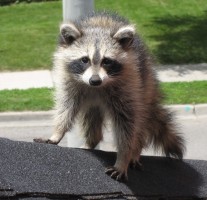
Skedaddle Humane Wildlife Control CEO and wildlife expert, Bill Dowd, is urging Business owners in the Hamilton and surrounding areas to be extra vigilant about looking for raccoon ‘hitchhikers,’ in the wake of four confirmed rabies cases in the Hamilton and surrounding areas.
Every year, Skedaddle Humane Wildlife Control’s wildlife technicians respond to calls from business owners who have raccoons stuck in their dumpsters, or raccoons in the back of delivery service vehicles.
With the recent discovery of the raccoon virus circulating the Hamilton area, business owners need to be extra vigilant about checking vehicles, bins, and dumpsters for raccoons, and calling the proper wildlife control technicians to remove them, if they are indeed discovered.
Homeowners and business owners should never try to touch or remove the raccoon themselves. Rabies can spread through saliva, so anything the raccoon may have touched may carry the virus if the raccoon was infected. Symptoms of rabies or Distemper my not be obvious immediately, so even if a raccoon appears healthy and normal, care should still be taken.
Gloves should be worn when opening garbage bins, and make sure they have the animals removed, so they don’t travel across the city in vehicles or bins and possibly spread viruses or diseases. Many business owners simply leave the raccoon in the dumpster, hoping it will leave on its own, which rarely happens.
There is speculation that the initial raccoon that contracted the rabies virus came over from the United States.
More than likely, it hitched a ride in a transport truck from the U.S., Skedaddle Humane Wildlife Control CEO Bill Dowd said. “Raccoons have been known to be great hitchhikers.”
Skedaddle Humane Wildlife Control responds to 50-70 homes and businesses a day to deal with wildlife issues. Approximately 70% of those calls are in response to raccoons. Raccoons upwards of 50 pounds have been discovered. All Skedaddle Humane Wildlife Control’s wildlife technicians are up to date on their rabies vaccinations.
“Some estimate about 100 raccoons per square kilometer, but that’s probably a bit low. Contrary to popular belief, raccoons aren’t lonesome animals, and if you think you have one, you probably have 10.” There are way more of them than you think,” said Dowd.
Watch: A Raccoon is rescued from a dumpster:


